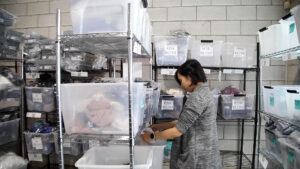Forward Fulfillment, Fewer Emissions: Eco-Friendly Returns
Projects Sponsor
Global e-commerce returns are wasteful, carbon-intensive, and often end in landfill. ReturnBear’s forward fulfillment model keeps returns in-country, eliminating unnecessary international shipping and reducing emissions by up to 96%. In just eighteen months, ReturnBear has processed over one and a half thousand localized return orders and saved over four and a half million kilograms of CO₂e—with a path to forty-five million annually. They’ve built cross-border infrastructure, recovered returned inventory from waste, and saved companies 30-60%. By reengineering how goods move in reverse, ReturnBear is offering customers and brands better returns all while giving the planet a ReturnBear hug.
ReturnBear, and its forward fulfillment model, was born out of a need to address one of the most overlooked sources of emissions and waste in e-commerce, internatio nal returns. Most global brands ship returns back across borders, generating thousands of kilograms of CO₂e per order and often simply landfilling inventory due to the cost and complexity of actually recovering the goods. The team behind ReturnBear wanted to prove that returns could be circular, low-emission, and operationally viable, even for small to mid-sized brands.
 They set out to design a localized reverse logistics system that minimized cross-border transport, reduced landfill waste, and helped merchants recover usable inventory. They wanted to build a smarter, greener return experience at scale—giving the planet a ReturnBear hug.
They set out to design a localized reverse logistics system that minimized cross-border transport, reduced landfill waste, and helped merchants recover usable inventory. They wanted to build a smarter, greener return experience at scale—giving the planet a ReturnBear hug.
Following preliminary research and objective setting, the team got to work building the operational and technical foundation for local returns. First, they partnered with drop-off networks like Cadillac Fairview to collect returns without packaging. Then, they established regional hubs in Canada, the US, the UK, and Australia to sort and verify returns in-country. Software to automate customs logic, tax reconciliation, and disposition decisions was developed—enabling brands to restock or resell without shipping items back.
The team then piloted the model with three brands, refined workflows, and expanded to high-volume merchants like SKIMS. Each stage was designed to reduce emissions, streamline operations, and recover value from returned inventory.
Navigating cross-border tax and customs compliance was no picnic for ReturnBear. Most brands avoid international returns because duties, VAT, and paperwork make recovery prohibitively complex. Their first attempts at automating customs workflows failed. There were simply too many edge cases, too little clarity from regulatory bodies but ReturnBear was not about to cave. By partnering with experts to test and refine in-market, ReturnBear was able to overcome these challenges and develop a system that was just right for everyone involved.
Understandably many brands were skeptical that local returns could work at scale or offer ROI. ReturnBear addressed this by starting small, using clear data, like the Verano Hill CO₂ savings, to prove value early and secure executive buy-in—thus building confidence in a ReturnBear bull market.
 A team at Cadillac Fairview, ReturnBear’s first major drop-off network partner helped ReturnBear pilot package-free returns at mall locations across Canada, enabling localized aggregation of returns at scale. Frate, a cross-border logistics technology partner, helped streamline carrier selection and route optimization for consolidated shipments between ReturnBear’s regional hubs. Their technical team worked closely with ReturnBear to integrate emissions-conscious routing logic.
A team at Cadillac Fairview, ReturnBear’s first major drop-off network partner helped ReturnBear pilot package-free returns at mall locations across Canada, enabling localized aggregation of returns at scale. Frate, a cross-border logistics technology partner, helped streamline carrier selection and route optimization for consolidated shipments between ReturnBear’s regional hubs. Their technical team worked closely with ReturnBear to integrate emissions-conscious routing logic.
Tentree and Verano Hill were among the earliest merchant adopters who co-developed pilot workflows with ReturnBear. Their operational feedback was essential in refining customs, relabeling, and restocking flows in local fulfillment. Importantly Staples Canada supported drop-off expansion by incorporating ReturnBear into select store locations, increasing consumer convenience, driving adoption.
ReturnBear’s forward fulfillment model has already dramatically reduced the emissions and waste associated with international returns. Since launch, they’ve processed 1,511 MFF orders, eliminating over 4.5 million kg of CO₂e—and that’s just from three merchants: Vivarays, Verano Hill, and Palladium Boots.
Verano Hill, a small Canadian brand, is a standout example of ReturnBears’s potential. But restocking locally and avoiding shipping returns back to China ReturnBear helped them claw back 1.13 million kg of CO₂e—the equivalent of planting 51,000 trees and letting them grow for 20 years. That this win came at no additional effort for the merchant suggests many more merchants will be ursa-signing on soon.
ReturnBear exceeded their early-stage objectives, proving the viability of localized, circular returns at scale while helping brands recover up to 40% of returned inventory that would have otherwise been discarded.
The project cut over four and a half million kilograms of CO₂e in under eighteen months, with a clear path to over forty-five million kilograms annually. That’s a meaningful climate win from a single operational shift—reducing emissions by up to 96% per return by keeping goods in-country.
 Far from hibernating on their success, ReturnBear has now signed three more brands, and are onboarding high-volume merchants like SKIMS and FIGS, with an expected 1,800+ MFF orders per country per month right there. If they scale MFF even ten times from current volume—a goal entirely within reach based on their already signed pipeline—ReturnBear would be saving over forty-five million kilograms of CO₂e annually—the equivalent of taking well over nine and a half thousand cars off the road.
Far from hibernating on their success, ReturnBear has now signed three more brands, and are onboarding high-volume merchants like SKIMS and FIGS, with an expected 1,800+ MFF orders per country per month right there. If they scale MFF even ten times from current volume—a goal entirely within reach based on their already signed pipeline—ReturnBear would be saving over forty-five million kilograms of CO₂e annually—the equivalent of taking well over nine and a half thousand cars off the road.
ReturnBear didn’t just optimize reverse logistics—they reengineered it. By combining localized drop-offs, automated customs processing, and circular inventory recovery, they built a scalable framework that any merchant or third-party logistics provider can adopt globally, raising another ReturnBear cub.
Most people think of returns as waste. ReturnBear is demonstrating the polar opposite. Brands and consumers have been shown that profitability, convenience, and sustainability can go paw in paw. It’s not just smart logistics—it’s a playbook for climate-positive commerce that others can follow, backed by so much real-world success that there’s just no denying it.













